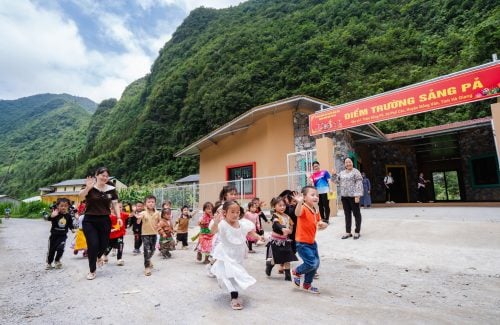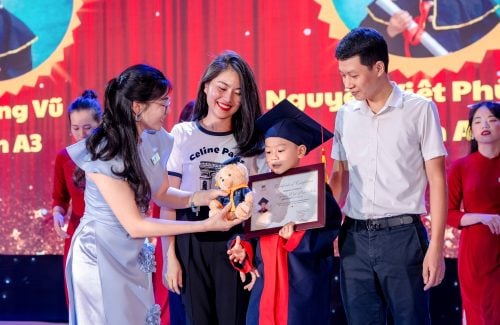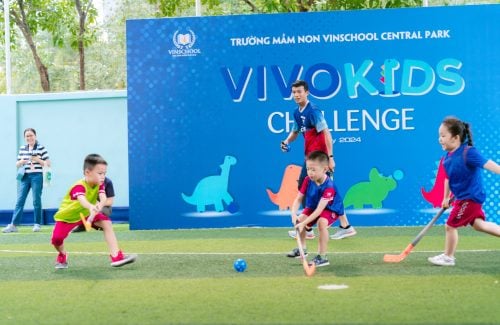Ways to Support a Child’s Language Development in the Early Years
Language is an extremely important part of children’s development. It is a foundation for children to develop their ability to communicate, learn, express their thinking and ideas, understand others’ feelings, and develop and maintain relationships. According to research on brain development by the Center on the Developing Child at Harvard University, neural connections develop most strongly in the early years of life, with more than 700 new neural connections formed every second. Surprisingly, the brain of a 2-year-old child has trillions of neural connections – twice the number of connections in an adult’s brain. This is why it is easier for children to learn languages at a very young age.
Parents and caregivers play an essential role in a child’s language development. With extensive experience in teaching language development to children, Vinschool Kindergarten would like to share with parents some suggestions to reference and build a language-rich environment, helping children learn to listen actively, engage in conversations, and develop optimal literacy skills.
1. Talk with and engage the child on a regular basis
Preschool children’s language development begins with sounds and gestures, then words and sentences. Therefore, from a child’s birth, parents can support their language development by interacting with them with different languages and gestures in different contexts.
Follow the child’s lead to understand his or her concerns. The cues may be a handwave, babbling sounds, or clear words. Parents should always respond to the child’s attempts to communicate. For example: When seeing the child reaching for a toy, parents can respond by saying, “Do you like this square? Can you reach it?”
When the child points to any object, follow him/her, point to it and teach him/her how to call out its name. When the child points to a word, read it aloud to make him/her gradually understand that written words and spoken words are linked together.
Regularly use words describing actions and feelings to talk about what is happening.
For example, “I’m making yoghurt for you to eat. Now I’ll open a carton of yogurt and feed you with a spoon.” / “It’s time to have a bath. Can you feel the warm water on your stomach? After bathing, you’ll dry yourself, put your clothes on and go out for a walk.” / “Are you playing with a doll? Are you feeding her?”
Repeat and build upon (talking or raising questions about) what the child says to encourage him/her to communicate more often.
For example: When the child says “apple”, parents can ask, “Do you want this red apple?”
When the child says: “I want to go to the supermarket” – A parent might ask, “What do you want to go to the supermarket for?”
Listen to the child, wait for him/her to respond, and expand his/her linguistic experience.
Give the child time to respond. Expand his or her experience. For example, if the child likes a picture, talk to him/her about it. If he/she is attracted to a boat, show him/her other boats and talk about them altogether.
2. Read with the child
Reading to preschoolers is one of the most important activities parents can do to prepare their child for reading and learning in the future. Reading enables children to be exposed to an extensive vocabulary, appropriate grammar, while simultaneously stimulating their imagination and increasing their concentration.
Parents are encouraged to read to their children for at least 15 minutes a day from birth. To conduct an effective reading activity with preschool children, parents can refer to the article “5 Effective Reading Tips for Children” shared by Vinschool Kindergarten teachers.
It is of great importance to choose an age-appropriate book. Children at different ages have different visual thinking and perception abilities. Adults often face difficulty in choosing suitable books for children under 3 years of age. For more options, parents can refer to the article “Recommendations in Choosing Books for Children Aged Under 3” shared from an educational perspective.
3. Music and field trips
Children love music and movement. Through music and field trips, children learn a lot about the world around them and the rhythm of language, thereby developing their vocabulary. A trip to the zoo, aquarium, museum or library, etc. can open up a whole new world for children to learn about language and life.
4. “Show & Tell” activity
“Show & Tell” is a regularly held activity at Vinschool Kindergarten to encourage children to develop the spoken language, actively listen to others and ask questions. Parents can use this activity to help the child build confidence because it is an opportunity for them to talk about things they are familiar with and love. The following steps are recommended by Vinschool teachers on how to organize a “Show & Tell” activity at home:
- Have family members or a group of children sit in a circle so that each person/child can see everyone else.
- Model how to introduce an object and talk about it (its shape, color, emotion, size, usage, etc.).
- Model how to ask good questions (“Who bought it?”; “Where is it from?”; “Since when did you have it?”; “What if …?”, etc.)
- Model how to listen actively and take turns. All family members then carry out the “Show & Tell” activity in turns.
What to keep in mind when accompanying a child’s language development:
- Always integrate fun and humor into educational methods; always encourage and praise the child;
- Give the child time to explore and discover without forcing them to do anything;
- Pay attention to the use of electronic devices because TV programs do not involve “interaction” and “response” – the two most important factors for children to learn language. As recommended by the American Academy of Pediatrics, children under 2 years of age should not watch television, and children over 2 years of age should only watch quality programs for a maximum of 2 hours a day.
It is hoped that the aforementioned methods from Vinschool Kindergarten teachers can help parents in the process of accompanying their children’s language development and creating a solid foundation for better skills and competencies and for their future success.
References: Raising Children Network (Australia) & Parents









